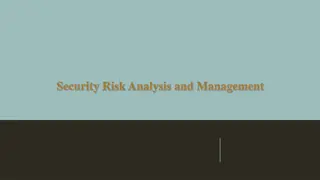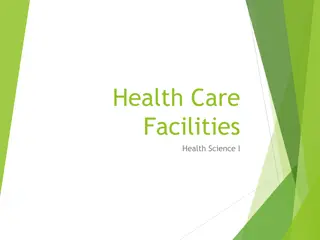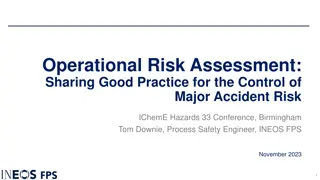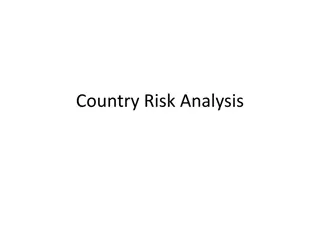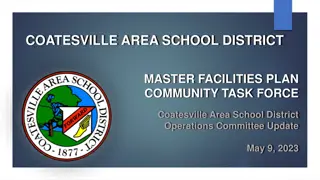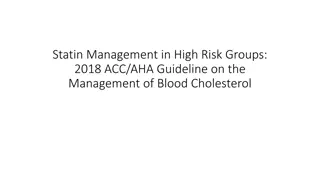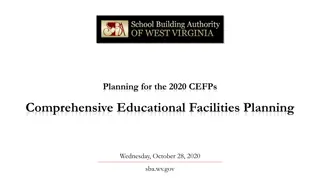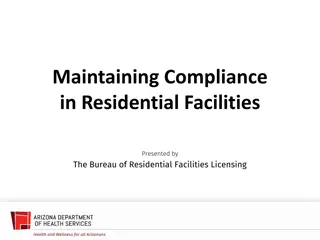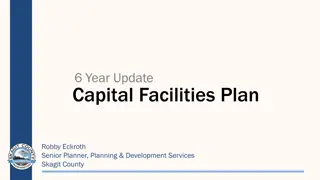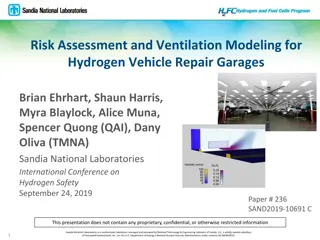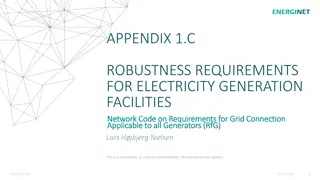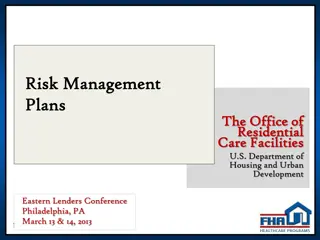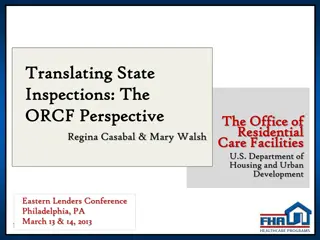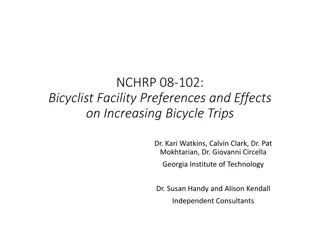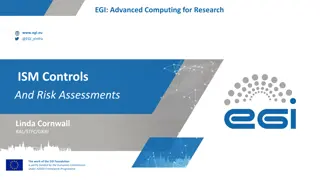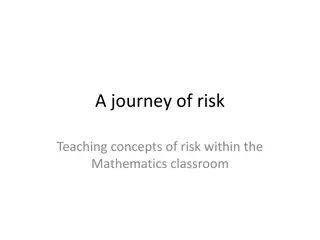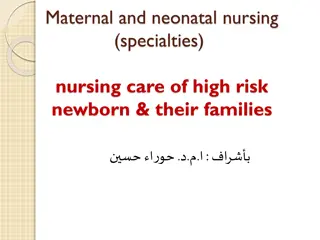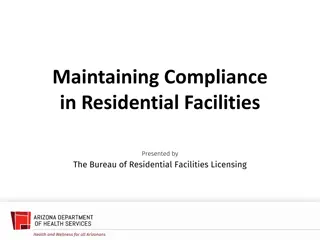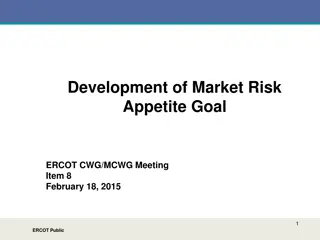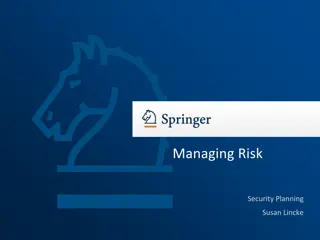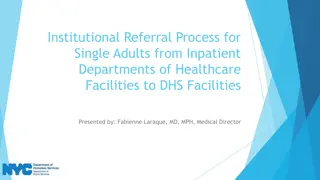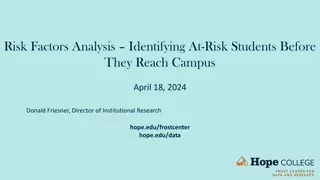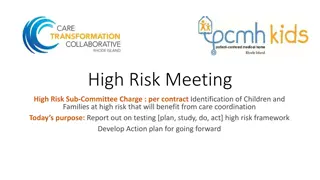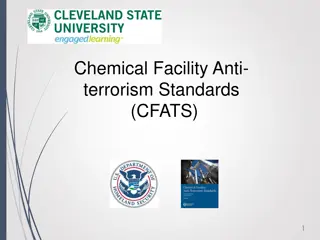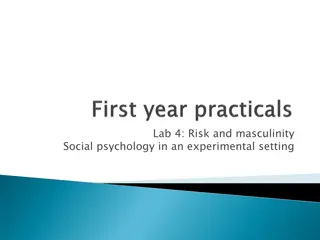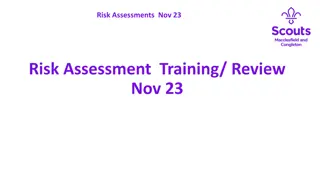Comprehensive Overview of Security Risk Analysis and Management
Explore the essential aspects of security risk analysis and management, including risk identification, assessment, and control techniques within an Information Security (InfoSec) context. Learn about the purpose of risk management, steps involved in a risk management plan, asset identification and c
0 views • 22 slides
Understanding Risk Management in Environmental Geography and Disaster Management
Risk management in environmental geography and disaster management involves assessing the potential losses from hazards, evaluating vulnerability and exposure, and implementing strategies to mitigate risks. It includes calculating risk, dealing with risk through acceptance, avoidance, reduction, or
1 views • 10 slides
Introduction to Flood Risk Assessment with HEC-FDA Overview
This presentation delves into flood risk assessment using HEC-FDA software, covering topics such as defining flood risk, components of uncertainty, consequences of flood risk, and methods to assess flood risk including hydrology, hydraulics, geotechnical, and economics. It explores the intersection
6 views • 39 slides
Health Care Facilities
Explore a comprehensive guide to various health care facilities, including hospitals, long-term care facilities, medical offices, and clinics. Learn about the types of hospitals, such as general, specialty, government, and university hospitals. Discover the functions of long-term care facilities lik
0 views • 9 slides
Operational Risk Assessment for Major Accident Control: Insights from IChemE Hazards 33 Conference
This content provides valuable insights into the importance of Operational Risk Assessment (ORA) in managing major accident risks in high hazard industries. It covers the necessity of ORA, identifying changes, risk assessment, and key success factors. Real-life examples like the Buncefield Terminal
0 views • 22 slides
Understanding Agricultural Risk Management in the Face of Natural Disasters
Exploring the impact of natural disasters on agricultural economics, this content delves into the challenges faced by farmers and the approaches available for managing risks. From analyzing the Billion-Dollar Disasters in the US to discussing private and public risk management provisions, the conten
3 views • 20 slides
Understanding Country Risk Analysis in International Business
Country risk analysis is crucial for multinational corporations (MNCs) to assess the potential impact of a country's environment on their financial outcomes. It includes evaluations of political and economic risks in foreign operations. Sovereign risk, political risk characteristics, and factors are
0 views • 61 slides
Enhancing Zoonotic Disease Risk Communication in Public Health Emergencies
Explore the significance of adopting a One Health approach to zoonotic disease risk assessment and communication in the context of emergency health situations. The session emphasizes core capacities required by the International Health Regulations (IHR) 2005, effective risk communication processes,
2 views • 13 slides
Coatesville Area School District Facilities Investment Plan Update
The Coatesville Area School District Operations Committee provided an update on the Master Facilities Plan, emphasizing the educational impact of facilities on student performance. The Community Task Force outlined priorities for renovations and new constructions to enhance student learning environm
0 views • 13 slides
Guideline for Statin Management in High-Risk Groups - 2018 ACC/AHA
This guideline outlines the management of blood cholesterol in high-risk groups according to the 2018 ACC/AHA recommendations. It discusses the overall approach, different statin management groups, justification for statin use in high-risk populations, high and moderate-intensity statin therapy, and
1 views • 14 slides
Project Risk Management Fundamentals: A Comprehensive Overview
Project risk management involves minimizing potential risks and maximizing opportunities through processes such as risk management planning, risk identification, qualitative and quantitative risk analysis, risk response planning, and risk monitoring and control. Quantitative risk analysis assesses t
0 views • 41 slides
Facility Improvement Suggestions for Sailing Club
Detailed suggestions for enhancing facilities at a sailing club include needs and wants across various areas such as race management, changing rooms, galley facilities, dinghy berthing, social areas, training resources, and more. Specific needs like good slipway access and comfortable amenities are
0 views • 12 slides
Comprehensive Educational Facilities Planning Overview
Comprehensive Educational Facilities Planning is essential for identifying current and future facility needs, predicting life-cycle costs, and accommodating educational innovations. The process entails creating an ongoing implementation plan that acts as a to-do list for facilities and fosters commu
0 views • 33 slides
Ensuring Compliance in Residential Facilities by Arizona Department of Health Services
Presented by the Bureau of Residential Facilities Licensing, this training emphasizes the importance of compliance with Arizona's rules and statutes for various residential healthcare facilities. The program covers survey types, Plan of Correction preparation, common deficiencies, Compliance Team in
2 views • 73 slides
Proposed Facilities Referendum Overview in Montgomery Township School District
Explore the need for a proposed facilities referendum in Montgomery Township School District, detailing the reasons behind it, the facilities needs assessment, board committee review, and recommended projects such as improvements at Montgomery High School and Upper Middle School. Discover how this r
0 views • 17 slides
Skagit County Capital Facilities Plan Update Overview
Skagit County is updating its Capital Facilities Plan to ensure public facilities and services support future development without decreasing current service levels. Internal changes include relocation of the Public Health Department and upgrades to facilities, while external changes involve updates
0 views • 6 slides
Risk Assessment and Ventilation Modeling for Hydrogen Vehicle Repair Garages
This paper discusses the demand for additional maintenance facilities in hydrogen vehicle repair garages due to the increased use of hydrogen fuel cell electric vehicles. It highlights the need for ventilation and upgrades in existing facilities to handle hydrogen releases during maintenance. The ob
0 views • 17 slides
Robustness Requirements for Electricity Generation Facilities
The document outlines robustness requirements for electricity generation facilities, covering fault-ride-through properties, clear time and voltage parameters for different types of generation facilities connected to both the distribution grid and transmission grid. Specific requirements for synchro
0 views • 8 slides
Comprehensive Risk Management Program for Residential Care Facilities
Implementing a robust risk management program is crucial for residential care facilities to control risks related to personal injury and other damages. The program should include incident reporting, tracking systems, staff training, and collaboration with experienced professionals and third-party pr
0 views • 23 slides
Importance of Licensure Compliance in Residential Care Facilities
This presentation delves into the critical role of licensure compliance in ensuring the success and viability of residential care facilities. The focus is on the Office of Residential Care Facilities' (ORCF) perspective, emphasizing the significance of maintaining provider status/licenses in securin
0 views • 39 slides
Integrated Healthcare Waste Management and WASH in Healthcare Facilities
National Workshop on Integrated Healthcare Waste Management (IHCWM) and Water Sanitation & Hygiene (WASH) in Healthcare Facilities highlighted the importance of following national standards, guidelines, and strategies for effective management of healthcare waste and ensuring proper water, sanitation
0 views • 32 slides
Understanding Bicyclist Facility Preferences for Increasing Bicycle Trips
This research study aims to investigate the various preferences and effects of different bicycle facilities on increasing bicycle trips. It explores how individual preferences for bike facilities differ and the effectiveness of these facilities in attracting new trips. The study delves into the impa
0 views • 52 slides
Understanding Risk Concepts and Management Strategies in Finance
Explore the essential concepts of risk in finance, such as risk definition, risk profiles, financial exposure, and types of financial risks. Learn about risk vs. reward trade-offs, identifying risk profiles, and tools to control financial risk. Understand the balance between risk and return, and the
0 views • 18 slides
Risk and Return Assessment in Financial Management
This comprehensive presentation explores the intricacies of risk and return assessment in the realm of financial management. Delve into understanding risk concepts, measuring risk and return, major risk categories, and the impact of risk aversion on investment decisions. Gain insights into the manag
0 views • 62 slides
Risk Management and Security Controls in Research Computing
The European Grid Infrastructure (EGI) Foundation conducts risk assessments and implements security controls in collaboration with the EOSC-hub project. The risk assessments involve evaluating threats, determining likelihood and impact, and recommending treatment for high-risk threats. Results from
0 views • 13 slides
Risk Management & MPTF Portfolio Analysis at Programme Level for UN Somalia
This session delves into the world of risk management and portfolio analysis at the programme/project level, specifically focusing on the Risk Management Unit of the United Nations Somalia. It covers enterprise risk management standards, planned risk management actions, the role of RMU, joint risk m
0 views • 30 slides
Alcohol and Cancer Risk: Understanding the Links
Alcohol consumption is linked to an increased risk of various cancers, including mouth, throat, esophagus, breast, liver, and colorectal cancers. Factors such as ethanol, acetaldehyde, nutrient absorption, estrogen levels, and liver cirrhosis play a role in this risk. Even light drinking can elevate
0 views • 17 slides
Understanding Risk Concepts in the Mathematics Classroom
Risk is a concept integral to decision-making in various aspects of life. This resource explores how risk is defined in the real world, its relevance in the classroom, and strategies for teaching risk literacy to students. It delves into the multiple definitions of risk, risk analysis, and the emoti
0 views • 62 slides
High-Risk Newborn Nursing Care and Factors
Maternal and neonatal nursing specialties focus on providing care for high-risk newborns and their families, who face conditions endangering the neonate's survival. Factors contributing to high-risk newborns include high-risk pregnancies, maternal medical illnesses like diabetes, labor complications
0 views • 25 slides
Guidelines for Compliance in Residential Facilities by Arizona Bureau
This comprehensive document outlines the compliance guidelines for residential facilities, presented by the Bureau of Residential Facilities Licensing in Arizona. It covers topics such as surveys, Plan of Correction preparation, common deficiencies, enforcement trends, and navigating additional reso
0 views • 73 slides
Understanding Organizational Risk Appetite and Tolerance
Explore the development of market risk appetite goals and how to define and establish organizational risk tolerance. Learn about the Classic Simplified View of Risk Tolerance and different methods to determine risk appetite. Discover the importance of assessing market risk impact and aligning risk t
0 views • 8 slides
Developing a Risk Appetite Culture: Importance and Framework
Risk management plays a critical role in the success of corporations, with strategy and risk being intertwined. This presentation delves into definitions of key terms such as risk appetite, the Risk Appetite Cycle, characteristics of a well-defined risk appetite, and the importance of expressing ris
0 views • 31 slides
Security Planning and Risk Management Overview
This content provides an in-depth exploration of managing risk, security planning, and risk appetite in the context of cybersecurity. It covers essential concepts such as risk management process, threat types, risk analysis strategies, vulnerability assessment, and risk mitigation techniques. The ma
0 views • 73 slides
Institutional Referral Process for Single Adults from Inpatient Departments to DHS Facilities
This presentation outlines the institutional referral process for single adults from inpatient departments of healthcare facilities to DHS facilities, focusing on screening referrals, coordinating care for medically appropriate individuals, and improving health outcomes. It covers goals, the shelter
0 views • 51 slides
Collective Effects in High-Energy Physics Facilities
Collective effects play a crucial role in Higgs factories and high-energy physics facilities. Impedance effects are proportional to beam-induced voltage, with peak bunch current impacting SB effects and average current affecting MB effects. Factors like beam loading compensation and detuning of the
0 views • 5 slides
Risk Factors Analysis: Identifying At-Risk Students Before They Reach Campus
Risk Factors Analysis aims to identify students at risk of attrition before they even arrive on campus by evaluating academic, financial, minority, and first-generation factors. The method involves choosing specific risk factors, tracking historical prevalence, calculating relative risk, and predict
0 views • 15 slides
High-Risk Meeting: Identification and Care Coordination for Vulnerable Children and Families
The high-risk sub-committee is tasked with identifying children and families at high risk and developing a care coordination plan for their benefit. The meeting agenda includes reviewing the high-risk framework, discussing results and impacts, reflecting on successes and challenges, setting meeting
0 views • 12 slides
Understanding Chemical Facility Anti-Terrorism Standards (CFATS)
Congress passed the Department of Homeland Security Act in 2007, granting DHS the authority to regulate high-risk chemical facilities and develop security regulations. CFATS, effective since 2007, requires high-risk facilities to enhance security. The regulations empower DHS to audit, inspect, and e
0 views • 13 slides
Understanding Risk and Masculinity in Social Psychology Experiments
This experimental setting explores the impact of testosterone levels on risk-taking behaviors, using digit ratio as a proxy measure for testosterone. The Balloon Analogue Risk Task (BART) is employed to assess risk-taking tendencies in individuals with high and low testosterone levels. The measureme
0 views • 7 slides
Comprehensive Risk Assessment Training Overview
In this risk assessment training session held on November 23, participants reviewed the process of writing and reviewing risk assessments to enhance the quality of assessments for safer scouting experiences. The training aimed to improve leaders' skills and confidence in risk assessment practices wh
0 views • 37 slides
